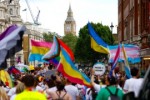Bridgerton is an American fantasy of ye olde England – right down to the absurd if enjoyably playful not-quite colour blind casting and its insinuation that Regency London was peopled with an equal number of Bame and white aristocrats. Even the casting of Queen Charlotte, played by half-Guyanese actress Golda Rosheuvel, is an allusion to the dubious speculation that the real Queen Charlotte had African heritage and was in fact a woman of colour.
So the unspoken final frontier of oppression is also the most debilitating: not being hot
Bridgerton’s beloved first season saw an explosively sexy performance from its male lead, an antisocial Duke played by the gorgeous British-Zimbabwean actor Regé-Jean Page. Its second season saw the promiscuous heir to the Bridgerton title, played by the gay actor Jonathan Bailey, fall head over heels for and marry the Indian gentlewoman Kate Sharma (played by Simone Ashley, the daughter of Indian Tamils). Bridgerton’s American provenance – it is made by Grey’s Anatomy’s Shonda Rhimes’s production company Shondaland – is flamboyantly obvious in its total rejection of the whiteness of English history.
So far, so diverse. All peoples shall come to the ball. But this season Rhimes is pushing her commitment to the intersectional to new and more interesting places. To recap for those who haven’t paid attention to feminist discourse for the past decade or so, intersectionality is all the ways you might be ‘oppressed’ – commonly described as ‘interlocking systems of oppression’ or, in other quarters, as ‘the oppression Olympics’. The term was coined by American legal scholar Kimberle Crenshaw in 1989 to denote that black women suffer more than white women and so on. It was a slow-burn at first, but as Gen Z came of age it became an essential hierarchy governing huge swathes of institutional and cultural policy. And as is the nature of these things, the more marginalised traits you possess, the more victimised you are historically, and therefore the more power you deserve now (with Jews as the glaring exception).
But not all vectors of marginalisation are created equal – at least where sexy scripts and trash romance television are concerned. The fact is, if you’re a casting director, you can fill your stage or screen with people of any sexuality, gender identity, age (within reason), ethnic background, religion, health status, psychological disorder (‘neurodiversity’) or even disability such as partial sight or hearing – and they can still look like perfect tens and thus plausible romantic leads.
And so the unspoken final frontier of oppression is also the most debilitating: not being hot. As the sociologist Catherine Hakim has written, ‘erotic capital’ is a key part of an individual’s ability to progress, impress and make money. It is certainly important if you want to have a lead romantic role in big American productions like Bridgerton. Attractive people, noted Hakim, have easier, more prosperous lives. Love and sex as well as money often come to them more easily than to the plain, old or chubby.
The only physical attribute that works against universal erotic capital in almost any context is fat. I should know, it takes one to know one. I blame my baby. But into that thorny bramble marches this season of Bridgerton, with podgy Penelope (Nicola Coughlan) as the star, finally attracting the tender gaze of perfect ten Colin Bridgerton, whom she has long loved and supported from a friendly yearning distance. Penelope’s frame is not generally named in Bridgerton’s world, but her bookish sexual marginality and apparent destiny to be unloved by Colin forever is clearly its result. Her life on a plump periphery of the svelte and beautiful is also the fuel behind her (spoiler alert) secret identity as the all-powerful gossip scribe Lady Whistledown.
Nicola Coughlan, one of the raunchy comic stars of Channel 4’s smash hit Derry Girls, is a lovely person to watch. She has an expressive face, and I always enjoy her trundling about shrubberies and across richly furnished rooms towards the nearest quill, or looking morosely on from the sidelines at grand balls.
But reader, she is not hot, and there is no escaping it, as I was reminded recently when she graced Harper’s Bazaar’s cover in a fabulous outfit that still did not change her not-hotness. Coughlan is an actress of great value, and might be adored, but she is simply not plausible as the friend who would catch the handsome rich aristocrat Colin Bridgerton’s eye in that way. She’s not shapely – which can work as sexy even in Hollywood; she’s fat. There’s nothing wrong with fat – it’s hardly a moral shortcoming – but a zest for equality and diversity (and in this case good acting) just isn’t enough to make a fat girl who wins the prince remotely plausible. In the cruel visual semantics of the screen, poor plump Penelope may be set up to win her man, but will she win her audience? The jury, dear reader, is out.
Courting approval / Bridgerton’s big fantasy
 407
407
 7
24.05.2024
7
24.05.2024
Bridgerton is an American fantasy of ye olde England – right down to the absurd if enjoyably playful not-quite colour blind casting and its insinuation that Regency London was peopled with an equal number of Bame and white aristocrats. Even the casting of Queen Charlotte, played by half-Guyanese actress Golda Rosheuvel, is an allusion to the dubious speculation that the real Queen Charlotte had African heritage and was in fact a woman of colour.
So the unspoken final frontier of oppression is also the most debilitating: not being hot
Bridgerton’s beloved first season saw an explosively sexy performance from its male lead, an antisocial Duke played by the gorgeous British-Zimbabwean actor Regé-Jean Page. Its second season saw the promiscuous heir to the Bridgerton title, played by the gay actor Jonathan Bailey, fall head over heels for and marry the Indian gentlewoman Kate Sharma (played by Simone Ashley, the daughter of Indian Tamils). Bridgerton’s American provenance – it is made by Grey’s Anatomy’s Shonda Rhimes’s production company Shondaland – is flamboyantly obvious in its total rejection of the whiteness of English history.
So far, so diverse. All peoples shall come to the ball. But this season........
© The Spectator
 visit website
visit website






















 Toi Staff
Toi Staff Mohamad Elmasry
Mohamad Elmasry Maoz Inon
Maoz Inon Belen Fernandez
Belen Fernandez Rachel Marsden
Rachel Marsden Patrick Gathara
Patrick Gathara Brahma Chellaney
Brahma Chellaney Srecko Horvat
Srecko Horvat Petra Lesjak Tušek
Petra Lesjak Tušek Julie Bindel
Julie Bindel
